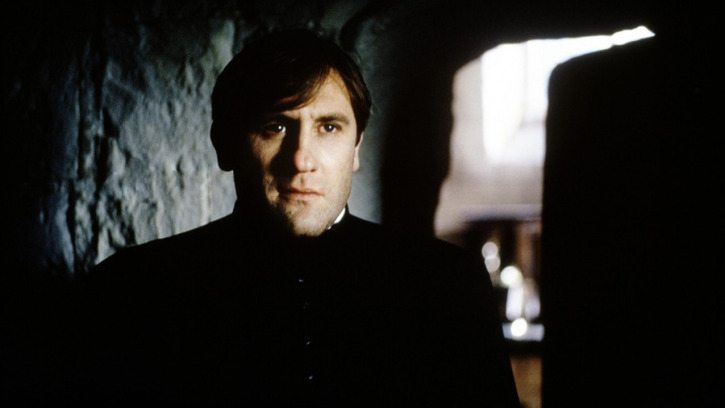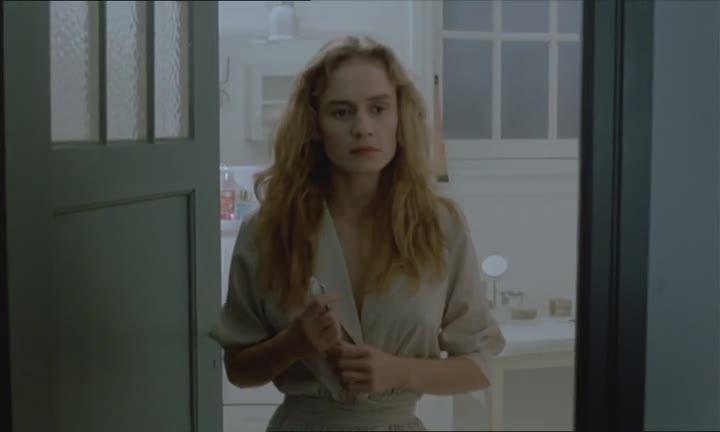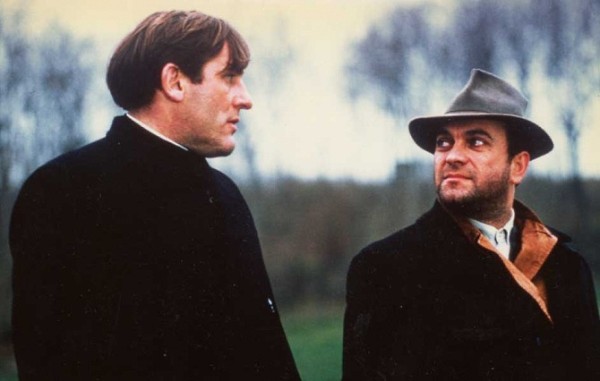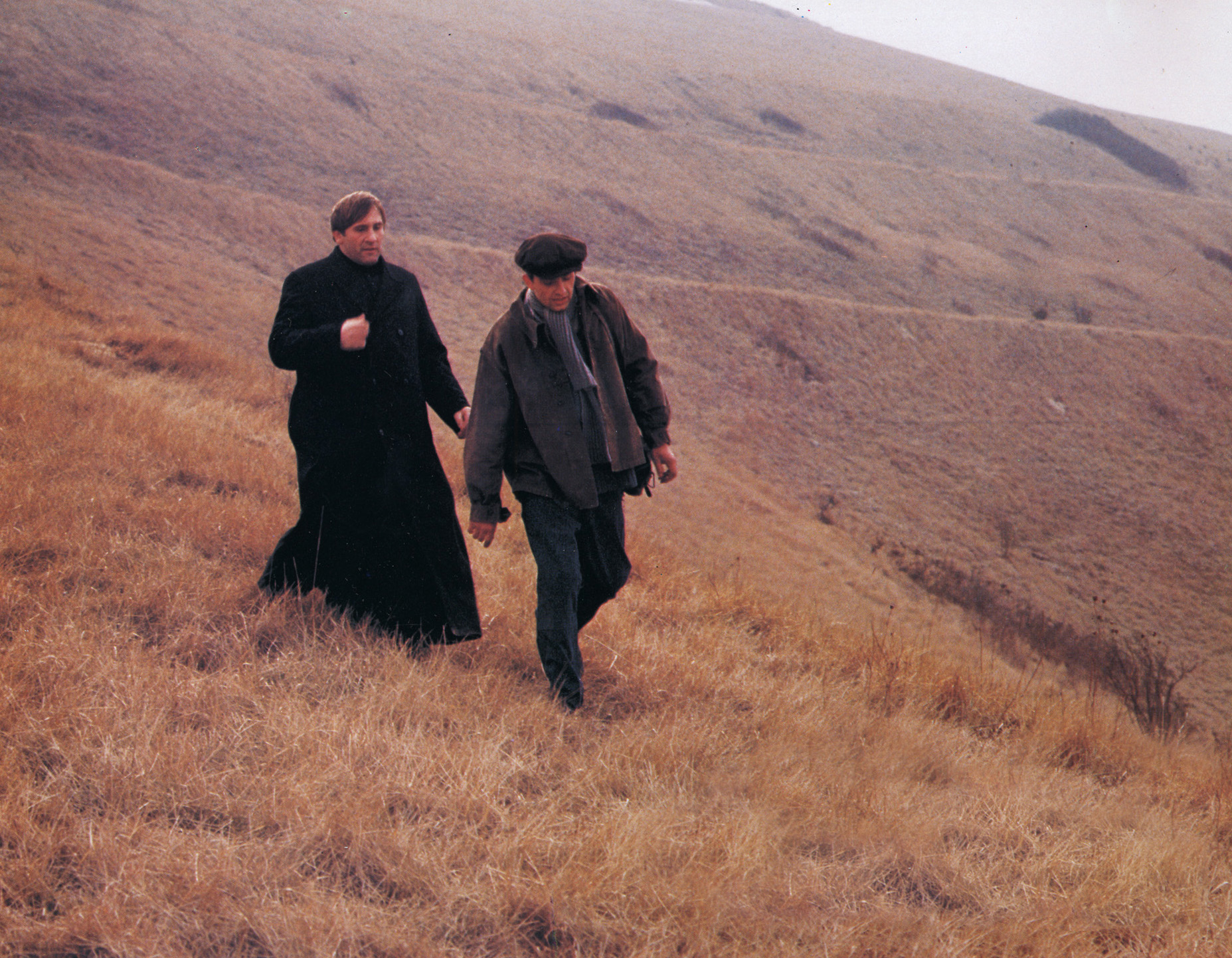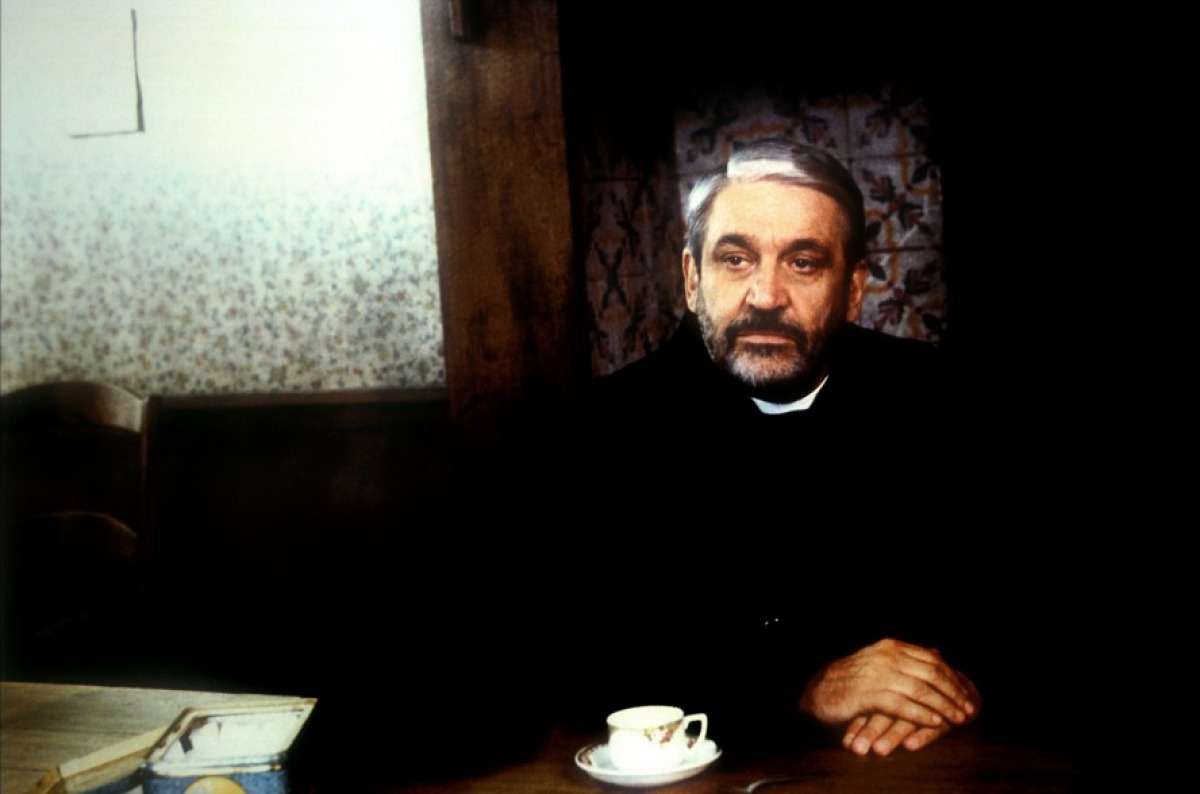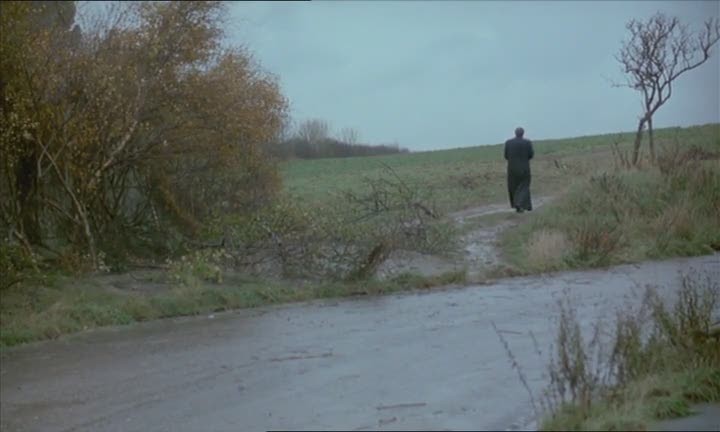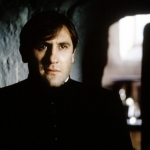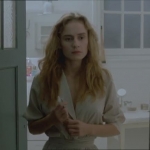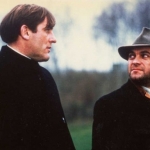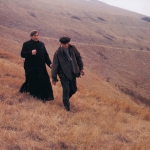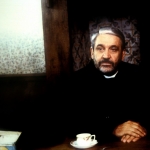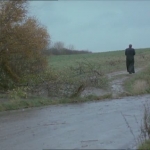At the turn of the century, in a small village in the Artois region, Father Donissan (Gérard Depardieu), a powerful and frustrated young curate, meets Satan one night in the disguise of a horse dealer. From that day on, he is continually confronted with the Devil, in particular in the person of Mouchette (Sandrine Bonnaire) who has killed the man whose child she is carrying and who, after a confrontation with Donissan, takes her own life. The priest then moves to another village where people soon come to look on him as a saint.
Réalisateur
REVUE DE PRESSE
Note d'intention de Maurice Pialat concernant le film-647
When did you first think of shooting an adaptation of Georges Bernanos’ novel ? Oh! A long time before I […]
Note d'intention de Maurice Pialat concernant le film-647
When did you first think of shooting an adaptation of Georges Bernanos' novel ?
Oh! A long time before I started making feature films. If it were possible, I'd like people to stop asking me that question… but I'm being a little naïve there.
When did you first read the book ?
About 30 years ago. Very few novels have made such an impact on me. Balzac, Dostoievski or Dickens, perhaps. I reread it three or four times, intending to film it each time.
Did your desire to make the film come from Sous le soleil de Satan or from Bernanos' work in general ?
I've read all of his novels but I think that the desire arises solely from this one. It was the first that I read and, since then, I have felt that Donissan was the perfect part for Gérard.
Was the book easy to adapt for the big screen ?
The adaptation was very simple. Sylvie Danton and I wrote three drafts. The first was still fairly literary, the second was much tighter and, you could say, filmable, and the third draft was the one used for the film. It came about quite simply but it's probably a much more exhaustive adaptation than people may think. We didn't claim to correct Bernanos but everyone knows that listening to a text, especially in the cinema, is different from reading it. And so, these are Bernanos' words but nearly never the exact words. The final result seems to me to be very close to what I read, similar to the work that Dreyer did on films like Ordet or Gertrud which were originally stage plays and therefore much more condensed than a novel.
Did you have to work on the construction in any particular way ?
No. The scenes are nearly all in their place. But some have been developed, while others have been shortened or even left out when we felt that we couldn't transpose them to the screen… I learned a lot of things in adapting this novel and it also confirmed a number of ideas that I had…
Such as?
People make such a fuss about adapting novels for the screen and not necessarily novels that are worth the effort. A film adaptation normally means a betrayal. I don't think that this is only a means of justifying the screenwriter's salary but people set out with the idea that everything has to be changed! Jean Anouilh once accepted a commission from FR3 for an adaptation of Balzac's Ursule Mirouet. He wrote it and then confided in me: "Balzac is wonderful, you simply copy it all out." Only Anouilh could have made such a simple remark.
Simplicity above all ?
Simenon, who can give all the information that we need, move the action along and create an atmosphere and a relationship between the characters all in the space of a few lines, once gave some advice to bad writers: "You want to write that it's raining? Well then, write: it's raining!"
Is that a necessary but insufficient condition for a good adaptation ?
The problem of adaptation is solved if the adapter has more talent than the writer whom he is adapting! That would be a perfect situation. But is any adapter more talented than Molière or Shakespeare? Or Bernanos!
In that case, why choose someone else's work ?
In someone else's work, you can find some things that you haven't thought of doing yourself. That is the case here. There again, this is my ninth film. It's my first adaptation and the other projects that I am working on aren't adaptations.
If you are too respectful of the original work, isn't that likely to weaken your direction ?
True, I did ask myself that while we were shooting. I was very respectful, too respectful perhaps, during the first half of the shoot. After, I burst out of that straightjacket and I felt much more comfortable. Being too faithful can be pathological at times. It's healthy to make free with the novel… But you have to retain a sense of proportion. All this is possible only thanks to the merits of novel and its author.
Did other authors inspire you and Sylvie for the dialogue?
There are a few lines that are by Bernanos but not from Sous le soleil de Satan. "I feel so old," for instance. There's also a quote from Valéry, a few lines by the Curé d'Ars and St Augustine… All this, added to what Sylvie and I wrote ourselves, makes up about 10% of the text.
Do you believe in the miracle in the film?
As we speak, I realize that the best thing I ever shot before Sous le soleil… is a similar scene in which a mother loses her child…
Are you thinking of La Maison des bois ?
Yes… I think that this is an obsessive theme for me… The grief of a mother who loses her child… I realized that I had shot La Maison des bois for that particular scene.
You were saying earlier that when you read a book with its filmed adaptation in mind, the main question is what can or cannot be filmed. Some people will probably think that you felt some of the novel's supernatural scenes couldn't be filmed.
No, those aren't the things that I feel can't be filmed.
So we can say that Sous le soleil de Satan may surprise those who see you as a champion of realism.
I don't like that pejorative definition. By realism, people tend to mean limited.
So we need to agree on the meaning of the word "realism" ?
Realism, as people tend to forget, is what is real. Therefore, it contains all genres since everything is real. For me the supernatural doesn't exist. It has no meaning. What people call the fantastic, and Sous le soleil de Satan is a classic of French fantastic literature, is always based on real things… A shepherd who claims that he has seen the Holy Virgin will describe her in images that correspond to what he has always seen and learnt.
Is that anthropomorphism ?
Not only. I think that animals see equally vivid images, those of their senses… So if that is realism, I'm a realist. That doesn't mean that I am only interested in life at a very basic level, life with its everyday problems.
So the treatment of Sous le soleil de Satan follows the continuum of your other films ?
There are very few differences.
Do you feel that you have surrendered to the temptation of easy effects yet ?
I believe that there is a handful of directors in the world, men like Bergman, Woody Allen, Casavettes, Bresson and perhaps a few others who aren't as well known who are not obliged to "clown around" - and I'm making no judgement as to their worth - who are in general good directors but whom I don't necessarily admire. I could be part of that list but I'm not because I have flirted a little with the other kind of cinema, almost for reasons of survival. Now, I may stand a chance of being admitted to that category of filmmakers who aren't handed a set of drums with the order, "Bang on those."
Do you believe in God ?
No. I could say, as Mouchette does, "God doesn't mean anything." And Bernanos didn't write that line.
In theory, purity is on Donissan's side ?
Mouchette and Donissan are equally pure. For Bernanos, they are brother and sister.
What about you ?
For me too.
Mouchette has a certain…
Perversity! That's a big word for it! I'll answer the question that you're not asking: for me, Mouchette is someone with a rare level of anti-conformism and audacity and who, if she didn't vanish dramatically, would be destined for the most extreme form of conformism.
Can one say that Father Donissan is subject to the perpetual lure of excess, close to certain of Bataille's ideas ?
You're starting to fall into one of the worst modern traps: you're becoming literary. I can't answer literary questions.
Did the fact of having much less everyday dialogue than on your other films alter your work with the actors ?
No… We found it a little harder at times. We had to alter certain lines. The actors occasionally had a tendency towards a certain degree of theatricality because the fine rhythm of the lines allowed them to take wing.
Were your impressions as an actor different from those you had on A nos amours ?
At first, for the first scene in the film between Gérard and myself, it all seemed to be going well… After, there were highs and lows. It's rather strange that I should always require spontaneity from my actors and only feel comfortable myself after a certain number of takes.
The modernity of the film ?
What already or still interests people is always modern… We'll see.
Oh! A long time before I started making feature films. If it were possible, I'd like people to stop asking me that question… but I'm being a little naïve there.
When did you first read the book ?
About 30 years ago. Very few novels have made such an impact on me. Balzac, Dostoievski or Dickens, perhaps. I reread it three or four times, intending to film it each time.
Did your desire to make the film come from Sous le soleil de Satan or from Bernanos' work in general ?
I've read all of his novels but I think that the desire arises solely from this one. It was the first that I read and, since then, I have felt that Donissan was the perfect part for Gérard.
Was the book easy to adapt for the big screen ?
The adaptation was very simple. Sylvie Danton and I wrote three drafts. The first was still fairly literary, the second was much tighter and, you could say, filmable, and the third draft was the one used for the film. It came about quite simply but it's probably a much more exhaustive adaptation than people may think. We didn't claim to correct Bernanos but everyone knows that listening to a text, especially in the cinema, is different from reading it. And so, these are Bernanos' words but nearly never the exact words. The final result seems to me to be very close to what I read, similar to the work that Dreyer did on films like Ordet or Gertrud which were originally stage plays and therefore much more condensed than a novel.
Did you have to work on the construction in any particular way ?
No. The scenes are nearly all in their place. But some have been developed, while others have been shortened or even left out when we felt that we couldn't transpose them to the screen… I learned a lot of things in adapting this novel and it also confirmed a number of ideas that I had…
Such as?
People make such a fuss about adapting novels for the screen and not necessarily novels that are worth the effort. A film adaptation normally means a betrayal. I don't think that this is only a means of justifying the screenwriter's salary but people set out with the idea that everything has to be changed! Jean Anouilh once accepted a commission from FR3 for an adaptation of Balzac's Ursule Mirouet. He wrote it and then confided in me: "Balzac is wonderful, you simply copy it all out." Only Anouilh could have made such a simple remark.
Simplicity above all ?
Simenon, who can give all the information that we need, move the action along and create an atmosphere and a relationship between the characters all in the space of a few lines, once gave some advice to bad writers: "You want to write that it's raining? Well then, write: it's raining!"
Is that a necessary but insufficient condition for a good adaptation ?
The problem of adaptation is solved if the adapter has more talent than the writer whom he is adapting! That would be a perfect situation. But is any adapter more talented than Molière or Shakespeare? Or Bernanos!
In that case, why choose someone else's work ?
In someone else's work, you can find some things that you haven't thought of doing yourself. That is the case here. There again, this is my ninth film. It's my first adaptation and the other projects that I am working on aren't adaptations.
If you are too respectful of the original work, isn't that likely to weaken your direction ?
True, I did ask myself that while we were shooting. I was very respectful, too respectful perhaps, during the first half of the shoot. After, I burst out of that straightjacket and I felt much more comfortable. Being too faithful can be pathological at times. It's healthy to make free with the novel… But you have to retain a sense of proportion. All this is possible only thanks to the merits of novel and its author.
Did other authors inspire you and Sylvie for the dialogue?
There are a few lines that are by Bernanos but not from Sous le soleil de Satan. "I feel so old," for instance. There's also a quote from Valéry, a few lines by the Curé d'Ars and St Augustine… All this, added to what Sylvie and I wrote ourselves, makes up about 10% of the text.
Do you believe in the miracle in the film?
As we speak, I realize that the best thing I ever shot before Sous le soleil… is a similar scene in which a mother loses her child…
Are you thinking of La Maison des bois ?
Yes… I think that this is an obsessive theme for me… The grief of a mother who loses her child… I realized that I had shot La Maison des bois for that particular scene.
You were saying earlier that when you read a book with its filmed adaptation in mind, the main question is what can or cannot be filmed. Some people will probably think that you felt some of the novel's supernatural scenes couldn't be filmed.
No, those aren't the things that I feel can't be filmed.
So we can say that Sous le soleil de Satan may surprise those who see you as a champion of realism.
I don't like that pejorative definition. By realism, people tend to mean limited.
So we need to agree on the meaning of the word "realism" ?
Realism, as people tend to forget, is what is real. Therefore, it contains all genres since everything is real. For me the supernatural doesn't exist. It has no meaning. What people call the fantastic, and Sous le soleil de Satan is a classic of French fantastic literature, is always based on real things… A shepherd who claims that he has seen the Holy Virgin will describe her in images that correspond to what he has always seen and learnt.
Is that anthropomorphism ?
Not only. I think that animals see equally vivid images, those of their senses… So if that is realism, I'm a realist. That doesn't mean that I am only interested in life at a very basic level, life with its everyday problems.
So the treatment of Sous le soleil de Satan follows the continuum of your other films ?
There are very few differences.
Do you feel that you have surrendered to the temptation of easy effects yet ?
I believe that there is a handful of directors in the world, men like Bergman, Woody Allen, Casavettes, Bresson and perhaps a few others who aren't as well known who are not obliged to "clown around" - and I'm making no judgement as to their worth - who are in general good directors but whom I don't necessarily admire. I could be part of that list but I'm not because I have flirted a little with the other kind of cinema, almost for reasons of survival. Now, I may stand a chance of being admitted to that category of filmmakers who aren't handed a set of drums with the order, "Bang on those."
Do you believe in God ?
No. I could say, as Mouchette does, "God doesn't mean anything." And Bernanos didn't write that line.
In theory, purity is on Donissan's side ?
Mouchette and Donissan are equally pure. For Bernanos, they are brother and sister.
What about you ?
For me too.
Mouchette has a certain…
Perversity! That's a big word for it! I'll answer the question that you're not asking: for me, Mouchette is someone with a rare level of anti-conformism and audacity and who, if she didn't vanish dramatically, would be destined for the most extreme form of conformism.
Can one say that Father Donissan is subject to the perpetual lure of excess, close to certain of Bataille's ideas ?
You're starting to fall into one of the worst modern traps: you're becoming literary. I can't answer literary questions.
Did the fact of having much less everyday dialogue than on your other films alter your work with the actors ?
No… We found it a little harder at times. We had to alter certain lines. The actors occasionally had a tendency towards a certain degree of theatricality because the fine rhythm of the lines allowed them to take wing.
Were your impressions as an actor different from those you had on A nos amours ?
At first, for the first scene in the film between Gérard and myself, it all seemed to be going well… After, there were highs and lows. It's rather strange that I should always require spontaneity from my actors and only feel comfortable myself after a certain number of takes.
The modernity of the film ?
What already or still interests people is always modern… We'll see.




